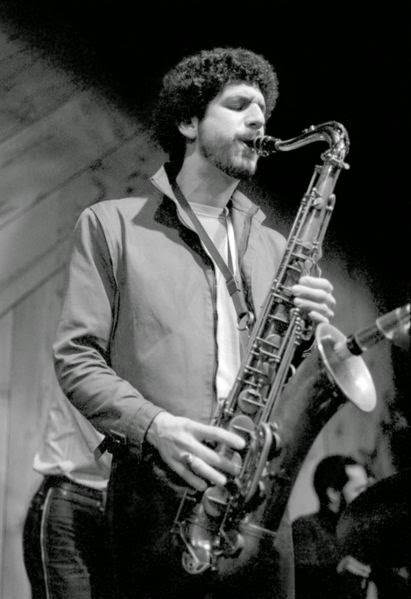JAM, VI: Bob Berg on "I Loves You, Porgy"
Every weekday this month I'll be posting new content in observance of Jazz Appreciation Month (J.A.M.), so-designated by the Smithsonian National Museum of American History beginning in 2001. International Jazz Day, so-designated by UNESCO in partnership with the Thelonious Monk Institute of Jazz, is on the last day of April, the 30th; it was first celebrated in 2012. Debating the relative merits of designating specific days or months for celebrating heritages, traditions, and the like aside, Jazz Appreciation Month is at the very least an excuse to dig into some material that I've been interested in for a while on the blog.
Yesterday's installment featured an '80s bootleg recording of Freddie Hubbard showing a young Wynton Marsalis who was still the baddest. Tomorrow's will feature Clifford Brown on what trumpeter John McNeil calls his favorite bebop trumpet solo.
†If you enjoy the content on this blog, please consider supporting my band's homegrown effort to get our record through the final stages of mastering and production. It's all recorded—you can listen to it now!—but we just need a bit more help to get to the finish line. We appreciate it. </self-promotion over>
* * * * *
Continuing the trend of #JazzAppreciationMonth as de facto #JazzBirthdayMonth, yesterday's birth anniversaries included not only those of Billie Holiday, Freddie Hubbard, and Donald Barthelme, but also saxophonist Bob Berg, born in '51, two years after Michael Brecker and two years before Bob Mintzer.
 |
| Bob Berg in '80 with Cedar Walton; that's Billy Higgins on drums! (Wikimedia Commons) |
This was also probably around the time I first heard Brecker's face-melting solo arrangements of "Naima," from Directions in Music with Herbie and Roy Hargrove as well as this longer, live version, which was floating around the internet before YouTube was really a thing (imagine that!).
Now, it'd be unfair just to lump Berg into the Brecker/post-Brecker bag, but it's undeniable the aesthetic similarities that Berg, Brecker, Mintzer, et al. shared. This is a topic worthy of a much longer essay, but in short I'll just say that I'm fascinated by the ongoing shifting of currents in jazz tenor style paradigms. Many of my teachers growing up had plenty of Brecker in their playing; it seemed unavoidable, given their generational proximity to him and the towering shadow he cast over all tenor players. It was really a sign of his influence that you had to deal with him one way or another coming up as a saxophonist, either by checking him out or else completely avoiding him, but you'd never not know who he was and what he sounded like.
Since then, it seems like the Brecker influence has waned considerably in my generation. I know a lot of tenor players around my age who hear post-Brecker-ish playing and think basically that it's corny/dated-sounded: the polished, compressed patterns; the bright, metallic sound; the up-and-down-the-horn-in-one-breath vibe. An old teacher from Philly remarked to me once, "Brecker ruined the eighth note for us"—everybody started playing it his way, with the repeated note-by-note mini-scoops. It was just a thing.
If anything, Mark Turner would be the Brecker to this generation as Brecker was maybe two generations before—it seems like everybody my age is ripping off Mark these days. For what it's worth, Mark admits readily to checking out Brecker, speaking with Ethan and going as far as to say:
Fuck those motherfuckers who don't give it up for Michael Brecker.But—and this is obvious, but important to say, regardless—Mark doesn't sound like Brecker (at least on the surface). He has his own sound, a true rarity, hence all the ripping-off.
In terms of tenor players after Brecker, Rick Margitza (b. '61) seems to have some Brecker in him, as do early Donny McCaslin (b. '66) and early Chris Potter (b. '71). I mean, it's sort of a false distinction: most saxophonists today have checked out Brecker in some capacity, but the degree to which you can hear him in obvious/less-obvious ways in their playing is what's interesting. In terms of tenor players my age, the most prominent player with Brecker in his sound is probably Chad Lekowitz-Brown.
But back to Berg: he's emphatically not a Brecker clone but a close contemporary with clear overlapping stylistic tendencies and a sound I'd call distinct. It's a bit thicker than Brecker's, to my ear, and his melodic sense is also different ("how so" is the whole other essay/dissertation/etc.). It's only once he's gone into those FMR (face-melting runs) that it's easier to instinctively think of Brecker.
*The solo cadenza, like a lot of other Brecker-era solo cadenzas, is very saxophone-specific with all of the overtone false-fingerings and the clever manipulation of the saxophone's natural tendencies to execute certain things that basically sound impossible. A lot of it is approximation, a fair amount of it is guesswork, but it's just a rough visual reference, as with all the other transcriptions on this site.
C
Bb
Eb
.png)
%2B2.png)
%2B3.png)
%2B4.png)
%2B5.png)
%2B6.png)
Comments
Post a Comment